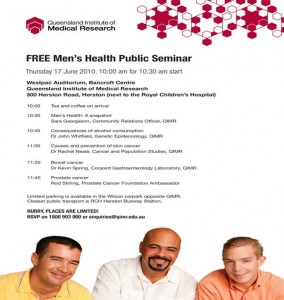Thank you to all who responded to this question about trust.
See below for a compilation of excerpts taken from responses which might be of general interest.
These include links to Readers Digest surveys of professions and people, Swinburne’s National Technology and Society Monitor and recent work out of CSIRO Energy Transformed Flagship.
Kind regards, Nancy
Assoc Prof Nancy Longnecker
Coordinator, Science Communication Program Faculty of Life and Physical Sciences The University of Western Australia
1) Readers Digest runs a survey on trust each year – for brands, individuals and professions.
The survey isn’t too bad by methodology and the data is tracked year by year.
Scientists rate 12 – but doctors and pharmacists might be considered by some to be scientists. In the individual trust category – many scientists rate very highly.
http://www.readersdigest.com.au/life/australias-most-trusted-professions -2009/article142043.html
http://www.readersdigest.com.au/life/australias-most-trusted-people-2009 /article141332.html
Dr Craig Cormick Manager Public Awareness and Community Engagement National Enabling Technologies Strategy
2) The closest thing I’ve seen is Reader’s Digest’s annual “Australia’s 100 most trusted individuals” list. I don’t know how rigorous they are – probably not very – but do appear there, though prominent medical professionals often do very well: in 2009 Dr Fiona Wood made the number one spot, with Professor Ian Frazer in third. Dr Karl – a fixture in the list for many years – came in at number 11.
The 2009 list can be found here: http://www.readersdigest.com.au/life/australias-most-trusted-people-2009/article141332.html
3) A 2008 Australian Reader’s Digest poll shows the trend: http://www.readersdigest.com.au/popular/australias-most-trusted-professions- 2008-readers-digest-australia/article77699.html
Some quick links to international polls include: http://businesstrends.wordpress.com/2009/08/04/most-prestigious-occupations- in-america/ http://www.chinadaily.com.cn/china/2010-04/27/content_9777169.htm
However, I also believe that another question should be asked about the scientific profession itself – which type of scientists from what industries are trusted more than others. I think it’s not correct to lump all scientists together. I work in healthcare and I know that pharmaceutical companies have a bad reputation as being fairly untrustworthy. Consequentially (and probably unfairly), scientists and healthcare professionals from pharma companies seem to have attached to them the bad stigma of the industry. I’m not sure how a survey about the science profession would work exactly, but it is an interesting question.
4) Hi Nancy
Apologies for the late reply. You might be interested in Swinburne’s National Technology and Society Monitor. Here’s a link to the 2009 edition: http://www.swinburne.edu.au/lss/spru/spru-monitor.html .
Cheers Chris KP
_______________________________ Chris Krishna-Pillay Victorian Manager, CSIRO Education CSIRO
5) There was a study done in 2009 by Swinburne called the National Technology and Society Monitor. It looked at groups of organisations rather than specific professions, and considered how trustworthy those organisations were in relation to the provision of science and technoloogy information. CSIRO came first, followed by universities, medical doctors, scientists and hospitals, then progressed downwards, ending with major international companies and commercial media..
6) The Who Cares about the environment in 2009? Survey asked residents of NSW (n=2003) the reliability of different information sources including scientists and technical specialists.
In 2009, 38% of respondents said that scientists and technical specialists were very reliable (which is a decrease from 2003 (n=1421) when 40% of respondents said they were very reliable, although an increase from 1994 when only 19% of respondents said they were very reliable).
For more about the Who Cares survey (which has run each three years since 1994) and more about these results, see the Department of Environment, Climate Change and Water NSW website at: http://www.environment.nsw.gov.au/community/Whocares2009.htm
7) …the “Who Cares about the Environment in 2009?” survey of NSW people’s environmental knowledge, attitudes and behaviours includes a question relating to perceived reliability of information sources (relating to the environment).
The results are on pages 56-60 of the full report that can be found at http://www.environment.nsw.gov.au/community/Whocares2009.htm.
A question about sources of environmental information is on Page 77.
8) The CSIRO Energy Flagship social sciences group asked in several of large group processes which has a question on trust. See in the links below.
http://www.csiro.au/resources/Perceptions-of-low-emission-energy-technologies-Perth.html
Similar studies were done in Melbourne, Adelaide and Brisbane which are all on the website too.
____________________________ From: Date: Mon, 7 Jun 2010 20:14:43 +1000 To: Conversation: [ASC-list] do Australians trust scientists? Subject: [ASC-list] do Australians trust scientists?
Hello all,
Does anyone know of any (recent) survey data that asks Australians whether they trust scientists, esp in comparison to other professional groups?
Kind regards, Nancy
Assoc Prof Nancy Longnecker
Coordinator, Science Communication Program Faculty of Life and Physical Sciences, M011 The University of Western Australia 35 Stirling Highway Crawley, WA 6009
ph: 61 8 6488 3926 email: nancy.longnecker@uwa.edu.au skype: nancylongnecker
There is no point explaining everything in the universe if no one is listening to you. (UWA Sci Comm student, 2009)
CRICOS Provider No. 00126G

